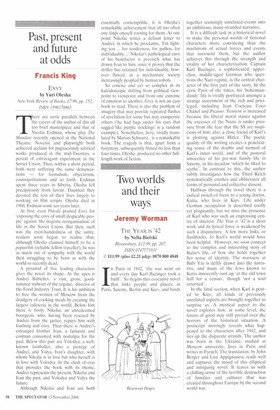Two worlds and their ways
Jeremy Worman
THE YEAR IS '42 by Nella Bielski Bloomsbury, £12.99, pp. 207, ISBN 0747571031 t £11.99 (plus £2.25 p&p) 0870 800 4848 1 n Paris in 1942, 'the war went on and every day Karl Bazinger took a bath'. So begins this evocative novel that links people and places, in Paris, Saxony, Berlin and Kiev, and binds
together seemingly unrelated events into an ambitious, many-stranded narrative.
It is a difficult task in a historical novel to make the personal worlds of fictional characters more convincing than the maelstrom of actual forces and events that surround them, but the author achieves this through the strength and vitality of her characterisation. Captain Karl Bazinger, a sophisticated, upperclass, middle-aged German who questions the Nazi regime, is the central character of the first part of the story. In the eerie Paris of the times, his 'bohemiandandy' life is vividly portrayed amongst a strange assortment of the rich and privileged, including Jean Cocteau, Coco Chanel and Picasso. Tension is increased because his liberal moral stance against the excesses of the Nazis is under pressure from the fear that the SS are suspicious of him; also, a close friend of Karl's is plotting against Hitler. The poetic quality of the writing creates a penetrating sense of the doubts and turmoil of Karl's inner world, and of the pastoral innocence of his pre-war family life in Saxony, in his meadow 'which he liked to scythe'. In contrast to this, the author subtly investigates how the Third Reich systematically crushes and obliterates all forms of personal and collective dissent.
Halfway through the novel there is a radical switch of focus to a young doctor, Katia, who lives in Kiev. Life under German occupation is described coolly yet poignantly, but we miss the presence of Karl who was such an engrossing centre of interest. The Year is '42 is a short work and its lyrical force is weakened by such a disjuncture. A few more links, or flashbacks, to Karl's world would have been helpful. However, we soon connect to the complex and interesting story of Katia's life, of how she holds together her sense of identity. The massacre at Babi Yar is deftly drawn into the narrative, and many of the Jews known to Katia innocently turn up 'at the old town hall for a census', though 'not a soul returned'.
In the final section, when Karl is posted to Kiev, all kinds of previously unrelated aspects arc brought together to surprise us. A mystical aspect to the novel explores how, at some level, the forces of good may still prevail over the horrors of the historical situation. A postscript movingly reveals what happened to the characters after 1942, and ties up the disparate strands. The author was born in the Ukraine, studied at Moscow university, lives in Paris and writes in French. The translation, by John Berger and Lisa Appignanesi, reads well and captures the mood of this elliptical and intriguing novel. It leaves us with a chilling sense of the terrible destruction of families and cultures that was created throughout Europe by the second world war.


























































































 Previous page
Previous page